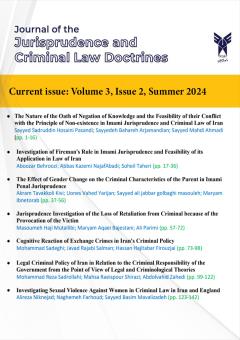The Effect of Gender Change on the Criminal Characteristics of the Parent in Imami Penal Jurisprudence
Subject Areas : Jurisprudence and Criminal Law DoctrinesAkram Tavakoli Kivi 1 , younes vahed yarijan 2 , Sayyed Ali Jabbar Golbaghi Masouleh 3 * , Maryam Ibn Torab 4
1 - Ph.D. student of jurisprudence and principles of Islamic law, North Tehran Branch, Islamic Azad University, Tehran, Iran
2 - Assistant Professor, Department of Jurisprudence and Principles of Islamic Law, North Tehran Branch, Islamic Azad University, Tehran, Iran
3 - Assistant Professor, Department of Jurisprudence and Law, Lahijan Branch, Islamic Azad University, Lahijan, Iran
4 - Assistant Professor, Department of Jurisprudence and Principles of Islamic Law, North Tehran Branch, Islamic Azad University, Tehran, Iran
Keywords: gender change, parent's criminal characteristics, parent's criminal privileges, parent's specific criminal verdicts,
Abstract :
The ability of medical science in discovering and proving the gender of neutral persons and treating a group of patients with gender non-believing identity and providing the speech about the possibility of gender change, the explanation of jurisprudence and legal verdicts of gender-changed people has been included in the list of discussions of contemporary jurisprudence. Gender is one of the effective variables in issuing a number of criminal sentences. The study of the written literature of Imami penal jurisprudence shows that sometimes, the description of being a parent is observed and favored in the implementation of a crime and the issuance of a verdict; Therefore, the parent, in case of committing a crime of which the parent is the victim or the plaintiff in a criminal case, has special criminal privileges and punishments. The following article, with the aim of explaining the criminal policy of Imami penal jurisprudence in the assumption of gender changing of the parent who commits the aforementioned crimes, by turning to the contemporary literature of Imami jurisprudence and identifying and analyzing the approaches and reasons of contemporary Shia jurists, has surveyed the effect of gender changing of the parent on the criminal professional verdicts and criminal exemptions and has reached the conclusion that the change of the parent's gender change does not affect his special verdicts and criminal privileges.
1. ابن فارس، احمد بن فارس، (1404ق)، معجم مقاییس اللغة، قم، انتشارات دفتر تبلیغات اسلامی (بوستان کتاب)، اول.
2. ابن منظور، محمد بن مكرم، (1414ق)، لسان العرب، بیروت، دار الفكر - دار صادر، سوم.
3. انصاری، محمد علی، (1415ق)، الموسوعة الفقهیة المیسرة، قم، مجمع الفکر الاسلامي، اول.
4. جمعی از پژوهشگران، (1423ق)، موسوعة الفقه الاسلامي طبقاً لمذهب اهل البیت علیهم السلام، قم، مؤسسه دائرة المعارف فقه اسلامی بر مذهب اهل بیت (ع)، اول.
5. جوهرى، اسماعيل بن حماد، (1410ق)، الصحاح ـ تاج اللغة و صحاح العربية، بیروت، دار العلم للملايين، اول.
6. حرعاملی، محمد بن حسن، (1409ق)، وسائل الشیعة، قم، مؤسسه آل البیت(ع).
7. حسینی خامنهای، سید علی، (1420ق)، أجوبة الاستفتاءات، بیروت، الدار الإسلامية.
8. حسینی زبيدى، سيد محمد مرتضى، (1414ق)، تاج العروس من جواهر القاموس، بیروت، دار الفكر، اول.
9. خرازی، سید محسن، (1423ق)، البحوث الهامة في المکاسب المحرمة، قم، مؤسسه در راه حق، اول.
10. خرازی، سید محسن، (1379)، تغییر جنسیت، فصل¬نامه فقه اهل بیت(ع)، پاییز، شماره: 23، ص104ـ147.
11. دهخدا، علی اکبر، (1377)، لغت نامه، تهران، انتشارات دانشگاه تهران، دوم.
12. سبحانی تبریزی، جعفر، (1391)، تغییر جنسیت از دیدگاه فقه اسلامی، فصل¬نامه فقه اهل بیت(ع)، سال هجدهم، بهار، شماره: 69، ص5ـ16.
13. سبحانی تبریزی، جعفر، (1392)، احکام صلاة القضاء، قم، مؤسسه امام صادق(ع)، اول.
14. سبحانی تبریزی، جعفر، (1397)، مسائل فقهیة، قم، مؤسسه امام صادق(ع)، اول.
15. صدر، سید محمد، (1420ق)، ما وراء الفقه، بیروت، دار الاضواء، اول.
16. طريحى، فخر الدين، (1416ق)، مجمع البحرين، تهران، كتابفروشى مرتضوى، سوم.
17. فضل الله، سید محمد حسین، (1419ق)، فقه الحیاة، بیروت، مؤسسة العارف للمطبوعات، سوم.
18. فيومى مقری، احمد بن محمد، (بی¬تا)، المصباح المنير في غريب الشرح الكبير للرافعي، قم، منشورات دار الرضي.
19. قائنی، محمد، (1424ق)، المبسوط في فقه المسائل المعاصرة ( المسائل الطبیة )، قم، مرکز فقه الائمة الاطهار(ع)، اول.
20. ﻗﻀﺎﻳﻲ، صمد، (1373)، پزشکی قانونی، تهران، انتشارات دانشگاه تهران.
21. مجلسی، محمد باقر بن محمد تقی، (1404ق)، مرآة العقول في شرح أخبار آل الرسول(ع)، تهران، انتشارات اسلامیه، دوم.
22. مجلسی، محمد باقر بن محمد تقی، (1406ق)، ملاذ الاخیار في فهم تهذیب الأخبار، قم، کتابخانه مرعشی نجفی، اول.
23. محسنی قندهاری، محمد آصف، (1424ق)، الفقه و مسائل طبیة، قم، انتشارات دفتر تبلیغات اسلامی (بوستان کتاب)، اول.
24. مشکینی، علی، (1377)، مصطلحات الفقه، قم، نشر الهادی.
25. مکارم شیرازی، ناصر، (1385)، الفتاوی الجدیدة، قم، مدرسه امام علی بن ابی طالب(ع)، دوم.
26. منتظری، حسینعلی، (1415ق)، دراسات في المکاسب المحرمة، قم، نشر تفکر، اول.
27. موسوی خمينى، سيد روح الله، (بی¬تا)، تحرير الوسيلة، قم، مؤسسه مطبوعات دار العلم، اول.
28. مؤمن قمی، محمد، (1415ق)، کلمات سدیدة في مسائل جدیدة، قم، دفتر انتشارات اسلامی، اول.
29. مؤمن قمی، محمد، (1375)، سخنی درباره تغییر جنسیت، فصل¬نامه فقه اهل بیت(ع)، سال دوم، پاییز، شماره: 7، ص91ـ114.
30. نجفی، هادی، (1387)، آراء الفقهیة، اصفهان، مهر قائم، اول.
31. هارون، عبد السلام، (بی¬تا)، المعجم الوسیط، تهران، انتشارات علمیه، اول.
32. هاشمی شاهرودی، سید محمود، (1432ق)، موسوعة الفقه الاسلامي المقارن، قم، مؤسسه دائرة المعارف فقه اسلامی بر مذهب اهل بیت(ع)، اول.

